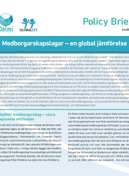In this anthology, different aspects of political participation are studied, focusing on individuals born outside Sweden or with a foreign background. Some of the questions answered in the report are: To what extent do different groups of foreigners vote and which parties do they vote for? What factors are associated with being elected and how can the representation gap be explained? How do the political parties work with their nominations? What role do ethnic associations play for political participation? What do we know about efforts to promote voter participation among foreigners?
Some overall conclusions and recommendations
- The result shows that foreign born take part in elections to a much lesser degree than domestic born and that there are differences between domestic born with two parents born abroad and other domestic born. The propensity to vote is larger among those that have one parent born in Sweden – in particular a mother – than those having two foreign born parents. Voting for individuals is somewhat more common among persons with foreign background. Persons with foreign background vote for the Social Democrats and the Left Party to somewhat higher extent than others.
- Immigrant representation in political assemblies has increased over the past decades but foreign born is still an underrepresented group. Explanations addressed in the book are individual resources and contextual factors. Results show little support for resource based explanations and the explanatory power of contextual factors is also limited, with the exception of the number of seats in local assemblies compared to the number of eligible voters. Up to one third of the representation gap on an aggregated level can be explained by the fact that foreign born more often live in larger municipalities where the number of seats in the local councils, in relation to the number of voters, is lower than in smaller municipalities.
- The political party’s nomination process is another factor relevant to consider when discussing underrepresentation. Internal factors of parties affecting the likelihood to be nominated as candidate are discussed. Networks are important in this respect. They play both an including and excluding role. Being a politician with immigrant background may offer a way into politics but may in the long run also be an obstacle for advancement. Other obstacles discussed include thresholds for participation, internal democratic processes of parties, and cost-benefit analysis.
- The question about the role of ethnic and minority associations for political participation is discussed in the book. The focus is on comparing the situation in Stockholm with other big cities in Europe. The results show that even though more persons are engaged in these associations in Stockholm, they do not offer better opportunities for political integration than in other larger cities in Europe. This suggests that economic and political support of ethnic associations plays a less important role for political integration than expected. At the same time, the results do not suggest that ethnic associations hinder political integration by contributing to isolation from the rest of society.
About the authors
The anthology, Voter participation and political respresentation 2017:7, is written by a total of twelve researchers from different disciplines. The editors are professor Pieter Bevelander and Professor Mikael Spång from Malmö University.
Picture by Element5 Digital from Unsplash.

